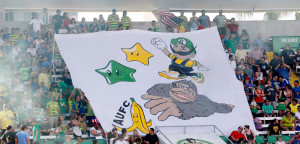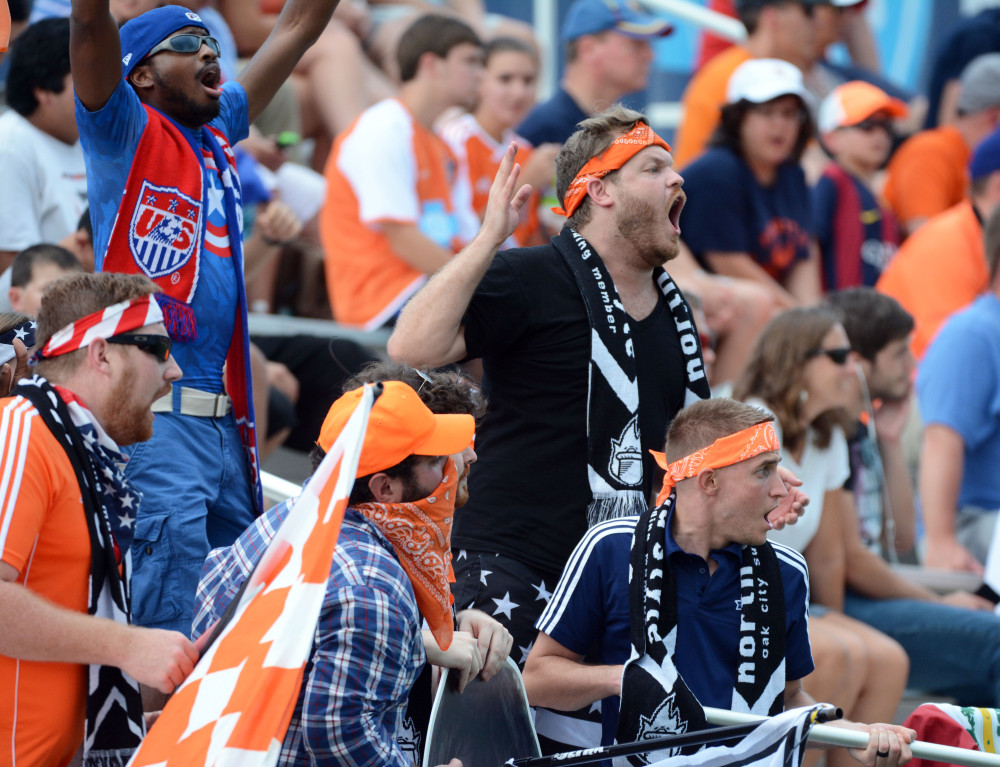Endline: I Don’t Care If Soccer “Makes It” In America
‘Endline’ is a weekly column in which David Martin surveys the NASL landscape for a topic of interest and fires a broadside of opinion. The content below reflects the opinion of the author alone and not that of Midfield Press or other individual staff.
Last week I wrote about the need for soccer supporters to branch their fandom outside of just their own team and to become fans of the league as a whole, and I offered a few suggestions to help accomplish this. I received a ton of feedback, ranging from accusations that I am secretly on MLS’ payroll (a criticism I receive frequently, somehow) to requests asking where fans could drop a sack of money to make Fantasy NASL come to life. But the feedback I heard more than any other, by a wide margin, was whether my suggestions would actually help grow the league and bring in new fans.
Readers can be forgiven for interpreting that conversation as one about “the cause.” Because some days it feels like every conversation we have about soccer is, overtly or subliminally, about whether this whole house of cards will be standing ten years from now, doesn’t it?
How many teams have you lost since you started watching? How far have you driven just to catch a game on TV? Hell, even how many leagues have evaporated like a mirage over the sands on which we’ve built too many Ozymandias statues? I totally get the inclination to make everything about building the sport bigger, but it’s a discussion that misses the point I was trying to make in the article, which was about ways to grow the league deeper rather than broader.
Because for the most part, I don’t really care how many more fans the sport brings in.

I have one demand on the success of my team and my league: still be here tomorrow. After that, when it comes to better game day experiences, sweeter stadiums, stronger media coverage, improved talent on the field, all of that to me is worth fighting for but never a signpost that we’ve made it or failed. Maybe I’m naïve. Maybe sometimes a soccer fan gets disappointed into some fairly low expectations. Maybe I’m grumpy my secret paycheck from MLS hasn’t arrived yet this week. But if I have a team that I can comfortably expect to survive, in a league that isn’t always at the threat of contraction, I can be satisfied.
Someone tell me when we know we’ve made it. What does “making it” look like? Media saturation? Teams competitive with the very top clubs in the world? Number one sport in the country by viewership, average attendance, revenue, etc.? I don’t think there are very many people arguing that those specifically are crucial targets. What I hear more is that we want our leagues themselves to be competitive with their counterparts throughout the globe. We want to compete for top players in their prime to make the product on the field as attractive as possible. We’d like to stop contracting so many computer viruses with all the illegal streaming it takes to even keep up with this thing. Noble goals and I don’t fault anyone for having them.
But achieving those goals, “making it” in America, isn’t all Moet et Chandon. Sure media ubiquity would do wonders for the public profile of the league. But the reality of that area of growth is that it does as much to put the game out of reach as it does to make it accessible. I can watch my local NFL team with just rabbit ears, which is nice. But if you want to watch the rest through NFL Sunday Ticket, apply for your second mortgage now while the rates are still low. The other “big” leagues in America are even worse. I can’t get the local Minnesota Twins game without a fairly robust cable or satellite package at a price my cord-cutting millennial self can’t justify. I don’t have another option. I could subscribe to MLB.tv, but they would black out my local team with the subscription. For all intents and purposes, I can’t watch my local MLB team unless I fork over serious money. An identical experience waits to be found for NBA and NHL fans. If one already has the cable or satellite package, and many do, then please enjoy. For this fan and a growing number of others, media ubiquity paradoxically makes the sport harder to follow. Is that the success we are in such a rush to achieve?
Then what about the quality of the games themselves? There is no shame in wanting to see world-class talent leaving us in awe with each incredible touch. I am not blind to the gap in ability between American leagues and many leagues across the globe. But that all comes with a cost, figuratively and literally.

World-class talent commands world-class bank accounts. For all of soccer’s roots as a sport of the working class, the monetization of the game worldwide has pushed it out of the reach of many of its diehard supporters of limited means. Ticket prices skyrocket to boost operating revenue, merchandise tears a hole in the wallet, and most dispiriting for me, clubs emerge as brands. The fan is continually commoditized, surveyed, observed, and filtered through a lens of which lucrative corporate sponsorships might have commercial synergy with an imaginary fan demographic. What’s that? My team’s newly designed home is called Jimmy John’s Field at Budwesier Arena? Stop staring directly into my soul, brand manager! The accessibility and the spirit of the game and one’s connection to his team suffers deeply as fiscal demands increase.
Of course that assumes the club was bought by the right billionaire investors to even enter the conversation of being a top team. How many owners and executives of dubious moral stature will it take for this to matter to us? At the top level, doing business with seedy partners comes with the territory if you want to pay for elite talent, because very few people stumble into billions of dollars running “Mom-and-Pop’s Ethically-Sourced Second-Hand Unicorn and Rainbow Emporium.” It takes serious dough to acquire the kind of players that “making it” presumes, and that rarely comes without compromises, whether in values, experience, or both. Is that the success we are in such a rush to achieve?
Finally, even if your club has reached the top through a takeover by benevolent John P. McRainbowBottom and his strategic corporate alignment with Awesomely Legit Sports and Kittens Holdings LLC., what has really been accomplished? A victory bought and paid for, nothing more. Is the soccer on the field a beautiful thing to behold? Of course, it certainly can be. But if Target rounded up eleven of the most incredible painters in the world and paid them a tremendous sum to crank out painting after painting that could then be mass reproduced and sold in their stores around the world, is the feeling the same for whatever beauty and talent might still be on display? Do you come into work on Monday eager to talk about the printed canvases you saw on Saturday? There is a soul to what is beautiful about the game when it is localized, fan driven, intimate, and earned.
I don’t pretend these concerns don’t already exist in American soccer. Sponsorships are part of paying the bills, and if you want to pay players of a remotely modest caliber a team needs to concern itself with a balance between fan experience and operational revenue. Please don’t read me as ignorant of this. But ideally it all comes with some semblance of balance. MLS currently commands a strong and still-improving fan base and quality of soccer, but works to maintain that level by leveraging bizarre roster rules designed to funnel talent into lucrative markets and through cash bath bacchanalia such as the despicable European summer friendly season. Press further on the continuum of “making it,” and maybe one finds Manchester City, a team which has bought its success on the strength of morally ambiguous dollars, a club which assures its continued financial feasibility by propping up sham clubs around the world for purposes bordering on money laundering. And Manchester City hasn’t even been dangerous in the Champions League. Does that mean they haven’t even made it? How will we ever know when we’ve made it?
I’m not against growth. Who wouldn’t like better soccer played in better surroundings? But I am tired of talking about it, and confused by the urgency with which people want to achieve that undefinable endgame. If I take a look at what “making it” looks like in soccer today, all I see is a supermodel: beautiful and glamourous, yet somehow plastic, unattainable, and without soulfulness.
All this curmudgeonliness leads to one final point:
Soccer in this country has persisted on a single strength alone, and that is the commitment and creativity of its fans.

We thank our millionaire club owners, but the sport in this country has thrived on moonlighting writers and podcasters, crowdfunded tifos, homegrown chants, and organic joy and misery. It has for decades. Soccer hasn’t reached its present relative zenith of popularity because commissioners chose better markets for expansion or because leadership learned from past mistakes; the suits haven’t learned from their mistakes in the last fifty years. Every fan has contributed spare parts, duct tape, glue, and elbow grease to get this jalopy down the road and now it’s in a pretty cool place. To plead for a bigger and bigger piece, to achieve that next level of “making it,” always means putting a little bit more back into the hands of commerce and relinquishing the ownership of what was nourished. It would be sad to cash in what has been accomplished to become a sport that is talented but milquetoast, legitimized but compromised.
Those fans are mighty. May they not soon look upon their own works and despair.

